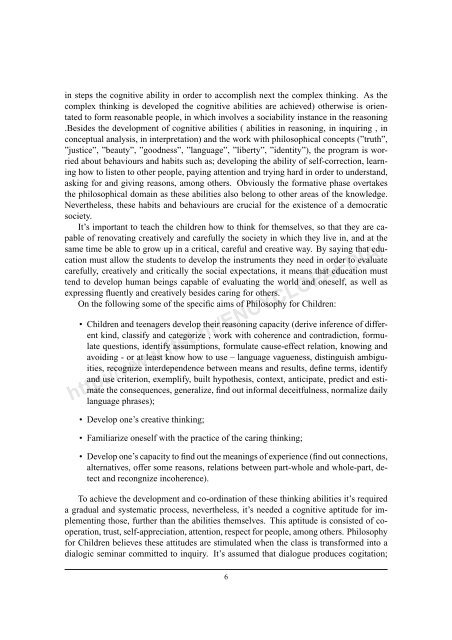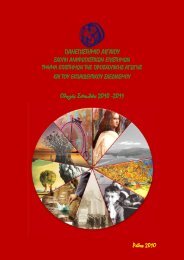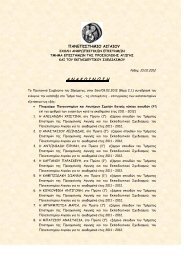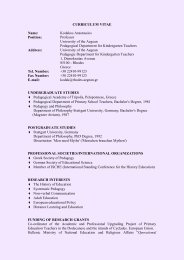Philosophy for Children
Philosophy for Children
Philosophy for Children
Create successful ePaper yourself
Turn your PDF publications into a flip-book with our unique Google optimized e-Paper software.
in steps the cognitive ability in order to accomplish next the complex thinking. As the<br />
complex thinking is developed the cognitive abilities are achieved) otherwise is orientated<br />
to <strong>for</strong>m reasonable people, in which involves a sociability instance in the reasoning<br />
.Besides the development of cognitive abilities ( abilities in reasoning, in inquiring , in<br />
conceptual analysis, in interpretation) and the work with philosophical concepts (”truth”,<br />
”justice”, ”beauty”, ”goodness”, ”language”, ”liberty”, ”identity”), the program is worried<br />
about behaviours and habits such as; developing the ability of self-correction, learning<br />
how to listen to other people, paying attention and trying hard in order to understand,<br />
asking <strong>for</strong> and giving reasons, among others. Obviously the <strong>for</strong>mative phase overtakes<br />
the philosophical domain as these abilities also belong to other areas of the knowledge.<br />
Nevertheless, these habits and behaviours are crucial <strong>for</strong> the existence of a democratic<br />
society.<br />
It’s important to teach the children how to think <strong>for</strong> themselves, so that they are capable<br />
of renovating creatively and carefully the society in which they live in, and at the<br />
same time be able to grow up in a critical, careful and creative way. By saying that education<br />
must allow the students to develop the instruments they need in order to evaluate<br />
carefully, creatively and critically the social expectations, it means that education must<br />
tend to develop human beings capable of evaluating the world and oneself, as well as<br />
expressing fluently and creatively besides caring <strong>for</strong> others.<br />
On the following some of the specific aims of <strong>Philosophy</strong> <strong>for</strong> <strong>Children</strong>:<br />
• <strong>Children</strong> and teenagers develop their reasoning capacity (derive inference of different<br />
kind, classify and categorize , work with coherence and contradiction, <strong>for</strong>mulate<br />
questions, identify assumptions, <strong>for</strong>mulate cause-effect relation, knowing and<br />
avoiding - or at least know how to use – language vagueness, distinguish ambiguities,<br />
recognize interdependence between means and results, define terms, identify<br />
and use criterion, exemplify, built hypothesis, context, anticipate, predict and estimate<br />
the consequences, generalize, find out in<strong>for</strong>mal deceitfulness, normalize daily<br />
language phrases);<br />
http://www.ffst.hr/ENCYCLOPAEDIA/<br />
• Develop one’s creative thinking;<br />
• Familiarize oneself with the practice of the caring thinking;<br />
• Develop one’s capacity to find out the meanings of experience (find out connections,<br />
alternatives, offer some reasons, relations between part-whole and whole-part, detect<br />
and recongnize incoherence).<br />
To achieve the development and co-ordination of these thinking abilities it’s required<br />
a gradual and systematic process, nevertheless, it’s needed a cognitive aptitude <strong>for</strong> implementing<br />
those, further than the abilities themselves. This aptitude is consisted of cooperation,<br />
trust, self-appreciation, attention, respect <strong>for</strong> people, among others. <strong>Philosophy</strong><br />
<strong>for</strong> <strong>Children</strong> believes these attitudes are stimulated when the class is trans<strong>for</strong>med into a<br />
dialogic seminar committed to inquiry. It’s assumed that dialogue produces cogitation;<br />
6






